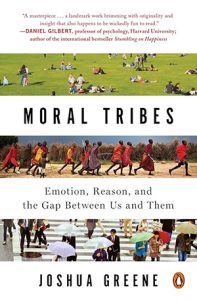Moral Tribes: Emotion, Readon, and the Gap Between Us and Them

Author: Joshua Greene
Publisher: Penguin Books
Year of Publication: 2014
Print Length: 432 pages
Genre: Non-Fiction / Popular Science, Neuroscience, Psychology, Philosophy
Topic: Ethics & Morality, Tribalism, Emotions, Us vs Them Mentality, Prejudice, Hate, Justice, Equity & Fairness
Our brains were designed for tribal life, for getting along with a select group of others (Us) and for fighting off everyone else (Them). But modern times have forced the world’s tribes into a shared space, resulting in epic clashes of values along with unprecedented opportunities.
As the world shrinks, the moral lines that divide us become more salient and more puzzling. We fight over everything from tax codes to gay marriage to global warming, and we wonder where, if at all, we can find our common ground.
A grand synthesis of neuroscience, psychology, and philosophy, Moral Tribes reveals the underlying causes of modern conflict and lights the way forward. Greene compares the human brain to a dual-mode camera, with point-and-shoot automatic settings (“portrait,” “landscape”) as well as a manual mode. Our point-and-shoot settings are our emotions—efficient, automated programs honed by evolution, culture, and personal experience. The brain’s manual mode is its capacity for deliberate reasoning, which makes our thinking flexible. Point-and-shoot emotions make us social animals, turning Me into Us. But they also make us tribal animals, turning Us against Them. Our tribal emotions make us fight—sometimes with bombs, sometimes with words—often with life-and-death stakes.
“Surprising and remarkable…Toggling between big ideas, technical details, and his personal intellectual journey, Greene writes a thesis suitable to both airplane reading and PhD seminars.” — The Boston Globe
Table of Contents
Introduction: The Tragedy of Commonsense Morality
PART I. MORAL PROBLEMS
1. The Tragedy of the Commons
2. Moral Machinery
3. Strife on the New Pastures
PART II. MORALITY FAST AND SLOW
4. Trolleyology
5. Efficiency, Flexibility, and the Dual-Process Brain
PART III. COMMON CURRENCY
6. A Splendid Idea
7. In Search of Common Currency
8. Common Currency Found
PART IV. MORAL CONVICTIONS
9. Alarming Acts
10. Justice and Fairness
PART V. MORAL SOLUTIONS
11. Deep Pragmatism
12. Beyond Point-and-Shoot Morality: Six Rules for Modern Herders
Acknowledgments
Notes
Bibliography
Image Credits
Index

Joshua Greene is Professor of Psychology and a member of the Center for Brain Science faculty at Harvard University. Much of his research has focused on the psychology and neuroscience of moral judgment, examining the interplay between emotion and reason in moral dilemmas. More recent work studies critical features of individual and collective intelligence. His current neuroscientific research examines how the brain combines concepts to form thoughts and how thoughts are manipulated in reasoning and imagination. His current behavioral research examines strategies for improved social decision-making and the alleviation of intergroup conflict.
Source: https://www.joshua-greene.net/about
More from Joshua Greene in this library, click here.
